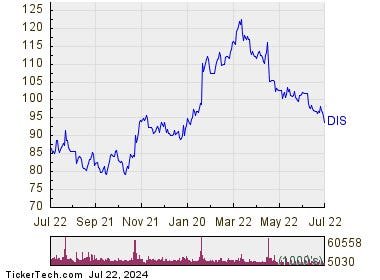Legendary investor Warren Buffett’s famous advice to be fearful when others are greedy and greedy when others are fearful is a sentiment that many investors take to heart. One way to measure the level of fear in a stock is through the Relative Strength Index (RSI), which measures momentum on a scale of zero to 100. A stock is considered oversold if its RSI falls below 30.
On Monday, shares of Walt Disney entered oversold territory, with an RSI reading of 27.2, after trading as low as $93.61 per share. In comparison, the RSI reading of the S&P 500 ETF (SPY) is 57.2. A bullish investor could see DIS’s low RSI reading as a sign that heavy selling may be nearing its end, and look for opportunities to buy. The chart shows DIS’s performance over the past year, with a low of $78.7309 and a high of $123.74.
Investors who follow Buffett’s advice may be interested in other oversold stocks as well. By analyzing RSI readings, investors can identify potential buying opportunities when stocks are oversold. It is important to consider other factors as well when making investment decisions, but RSI can provide valuable insight into market sentiment and potential price movements.
Investors should be cautious when interpreting RSI readings, as oversold conditions do not always guarantee a rebound in stock prices. It is important to consider other technical and fundamental factors before making investment decisions. However, using RSI as a tool to gauge market sentiment can help investors make more informed choices and potentially capitalize on buying opportunities.
At a time when market volatility is high and uncertainty prevails, using indicators like RSI can help investors navigate the ups and downs of the market. By following Buffett’s advice to be greedy when others are fearful, investors can take advantage of oversold conditions to potentially find opportunities for profit. As always, it is important to do thorough research and consider all factors before making investment decisions.











